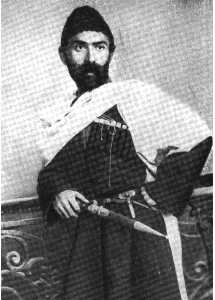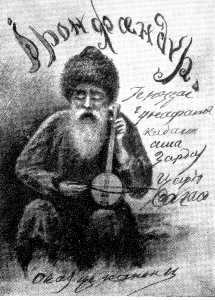 There is a period in any nation's life when the underlying thoughts and sentiments are bound to burst out and express the historical requirements in a variety of ways. The relevant period in the life of the small Ossetian people happened towards the end of the 19th century when they were experiencing the beneficial influence of a powerful revolutionary movement in Russia and the accumulated vigour of the people was expressing itself in different ways. The brightest was the activity of Kosta Khetagurov, a remarkable son of Ossetia.
There is a period in any nation's life when the underlying thoughts and sentiments are bound to burst out and express the historical requirements in a variety of ways. The relevant period in the life of the small Ossetian people happened towards the end of the 19th century when they were experiencing the beneficial influence of a powerful revolutionary movement in Russia and the accumulated vigour of the people was expressing itself in different ways. The brightest was the activity of Kosta Khetagurov, a remarkable son of Ossetia.
Kosta Khetagurov was born on October 15, 1859, in a small mountain village called Nar in the Alagir gorge of North Ossetia. In school he excelled in drawing. Subsequently, when he was attending the Stavropol lyceum, his tal-ent was noted and appreciated by a Russian drawing master, V. Smirnov.
Kosta's father was dreaming of seeing his son in an officer's uniform but Kosta was bent on becoming an artist. In 1881 he entered the Academy of Arts in Petersburg. Everyone expected him to devote his whole life to art. For some reason, however, he was deprived of his stipend - his only means of existence. For some time he kept body and soul together by doing odd jobs but later was obliged to return home. We do not know why he was treated so harshly but there are grounds to believe that this was one of the results of increasing political reaction in Russia.
At first Kosta lived on the money earned from private commissions. Shortly afterwards he arranged an exhibition of his paintings. This was a great event in Vladikavkaz. We know from contemporary reports that the exhibition was a success. His "Children Stone-breakers", "In an Ossetian Hut", "The Zikara Pass" and other paintings are real masterpieces. One of the reporters wrote that Kosta's canvas "St.Nina", which was exhibited, attracted everybody's attention, that many visitors asked the custodian to allow them to come up to the work and see whether it was a painting, not an alabaster statue. Indeed, it is a piece of superb painting. The young artist's popularity grew so quickly that theatres were eager to offer him a contract to do the stage scenery for them. They advertised this widely which drew strong protests from Kosta.
Who knows how many excellent canvases of Kosta Khetagurov could now have been in museums! However, his return to the home he had left in early childhood produced new feelings and new interests in the artist. There he had found, most unexpectedly, such a dreary situation that he was astounded, and this feeling found expression both in his verse and in his canvases. However, he more and more often put down his brush and took up his pen. This was the birth of a great poet who wrote in both Ossetian and Russian. He published his first book - a collection of poems written in the Russian language. Educated in the finest traditions of Russian revolutionary-democratic literature, Kosta dedicated all his emotions to the cause of his people.
The main theme in his poetry is a high sense of patriotism. It is evident all through his immortal collection of verses -"The Ossetian Lyre" ("Iron
fændyr") which has been the favorite book of the Ossetians ever since its first publication in 1899. Few poets have had such popularity among the people as Kosta Khetagurov. Many of his verses long ago became popular songs, his maxims became bywords among the people. Some of his poems are truly overwhelming. Take his "Mother of Orphans". This verse is about the widow and children of an Ossetian who perished in a mountain avalanche. They are sitting around a pitiful, smoky hearth. The children are weeping from hunger and cold while the mother is trying to soothe them, begging them not to cry but to wait for the beans to be cooked. The children continue to weep, then grow tired and fall asleep. The mother covers them with some rags then, sitting next to them, takes up her own wail in which she reproaches her husband for dying and leaving his family behind.
"And while dark and dismal
Still the ashes glowed,
She could not with weeping
Ease her heart's dire load.
Then she told the children:
"See, I'm boiling beans!"
Really she was cooking
Pebbles for her weans." *
All truly great popular poets have many things in common. The poetry of Kosta is similar to that of Mikhail
Lermontov, Nikolai Nekrasov, Robert Burns, Taras Shevchenko... Could it be because all of them devoted their lives to the struggle for kindness, justice, freedom? In this sense they are real brothers by their work and their destinies. The verse "Standing by the Monument to Lermontov" which was written on the occasion of the unveiling of the monument to the poet in Pyatigorsk in the Northern Caucasus, Kosta exclaims:
"My dear fatherland, celebrate
gladly once more,
And forget your misfortunes out
dated,
Your most secret and innermost
thought starts to soar-
Here 's the herald of freedom
long - waited..."
He himself became one of the "heralds of freedom long - waited" and he daringly urges "the sons of Ossetia" to struggle:
"To the truths radiance
Boldly go treading.
Cowards and lay-abouts,
Clear off, no meddling!"
Representatives of different peoples of the multinational Caucasus looked up to this Ossetian poet-rebel. He was not a mere enlightener - he was a disinterested defender of their rights. And his humanism goes far beyond the framework of the Caucasus. He was devoid of any national seclusion, he belonged to mankind. Only an internationalist could write:
"The world's my shrine, and
love's my sacred treasure,
The universe is fatherland
for me...."
To use the words of Soviet poet Nikolai Tikhonov, Kosta Khetagurov "became an asset for progressive thought, the foremost art and the vanguard of mankind" and therefore "he joined by right the great family of world classical writers".
All his noble life he dedicated to the good of people, at the same time he consistetly struggled with bootlickers, hypocrites, grafters, trucklers and the like. Kosta showed the cruelty, gluttony and pomposity of the upper strata of the society.
Poet Kosta Khetagurov perceived the roots of social injustice and identified his attitude to it in his paintings, articles and verses. These are the words he addressed to those who eat well and are happy:
"Your happiness -1 don't require it –
No happiness for the people
there...
In brilliant mansions I'm expiring,
Fainting and blinded by their
glare...
For ages built by slavedom tor-
tured,
In them the groans of orphans
choke,
In them the wine with tears is wa-
tered-
No, by yourselves enjoy good
fortune,
Where so unfortunate is the folk!"
Neither reprisals nor exile by the tsarist administration broke his will. Kosta always remained an unbending fighter for people's happiness.
"I've known no happiness, but I'd
give my freedom
Which I am used, like happiness,
to prize,
If I might pave one step the way
to freedom,
That road which waiting for the
people lies."
That Kosta was an extraordinary gifted person endowed with transcendent mental superiority is beyond doubt. But there are other factors which had a decisive influence on his life. One of these is his entourage, the influence of Russian democratic traditions in art and literature.
Naturally, of prime importance was the whole Ossetian (Alanian) culture and way of life, the Ossetian folklore with heroic Nartæ kadægs (epic songs) in the first place. In short, everything which can be classified as
Ossetianity or Alanity.
What a creation the poem "Æfsati" is! (The poet pictured here the image of the Lord of Wild Animals). No translator is able to render its whole beauty and style adequately. And what a song is Kosta's "Qubady"! (Here Kosta portrayed the popular bard). And what a... I aver there is a point which is beyond experts of Kosta's translators. It's the spirit of his poetry which is so difficult to render into the target language. To comprehend or, better to say, to enjoy Kosta's Ossetian poems and songs one must be able to think and feel like
...Kosta. But how to achieve it? "Ay, there's the rub!"
And what a fable-writer he was! His fables "A Stag and a Hedgehog", "A Fox and a Badger", "Faster", "A Black Radish and Honey" and others are real gems of poetry. Kosta used some popular migrant subjects for his fables - "A Wolf and a Crane", "A Crow and a Fox", etc. If we compare these pieces with corresponding fables by Phaedrus, La Fontaine or Krylov, we'll see that Kosta developed his own style in this genre. I am sure that Kosta Khetagurov's name must be ranked with the names of prominent fable-writers.
Kosta appears not only as an artist and a poet. He was an outstanding public figure, a fighter, a publicist, an actor... He was a staunch champion of justice, a defender of the oppressed and poor and, as such, he reacted every social and national injustice. His activity led to conflicts with the local authorities and, as a result, in 1895 he was banished from the Terek region. Kosta settled down in Stavropol. Later on he moved to Pyatigorsk. The restless and disturbing poet and publicist became an eyesore to the tsarist administration and in 1899 he was exiled to Kherson. This second exile was an irremedial blow which greatly affected his health. Only In 1901 Kosta returned to Ossetia. His friends couldn't recognize the active, lively, exuberant Kosta of former days. He was seriously ill and failing rapidly.
Kosta Khetagurov prophetically sensed the breakdown of the old world and exclaimed that
"...the dawn is breaking,
the sun is gleaming on the bay-
onets".
Alas! He had seen but the first ray, not the sunrise, of the new life - he died after a long illness in 1906.
Since Kosta's days Ossetia has undergone radical changes. Today it is a land of advanced culture with its three universities, one of which bears Kosta Khetagurov's name, the Medical Academy, the well-known State Academic Drama Theatre, the famous Russian Theatre, the State Musical Theatre, well-equipped factories and mills, hundreds of colleges and schools, excellent stadiums and other sport centers, etc. The Republic of North Ossetia-Alania is proud of its scientists, writers, actors, engineers, generals, sportsmen...
Kosta's influence on forming the Ossetian mentality is immense, and we believe that his beneficial moral power will be everlasting.
Kosta's works have been translated into many languages and are widely known in the world.
Cultural legacies are tested by time. Many things have fallen into oblivion, never to reappear but truly talented works are never forgotten - they continue to serve people.
A magnificent monument has been erected in Vladikavkaz - the capital of North Ossetia-Alania. It carries the following inscription: "To Kosta Khetagurov, the founder of Ossetian literature - from the government of the Soviet Onion". This is a token of recognition and general respect to the memory of this great son of the Ossetian
nation.
I have used the material from book "The genius of brush and pen"
of Tamerlan A.Guriev, Vladikavkaz, 2004
![]()